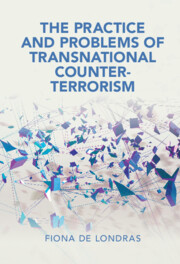Book contents
- The Practice and Problems of Transnational Counter-Terrorism
- Cambridge Studies in Law and Society
- The Practice and Problems of Transnational Counter-Terrorism
- Copyright page
- Contents
- Acknowledgements
- Abbreviations
- Introduction
- 1 The Institutions of Transnational Counter-Terrorism
- 2 The Law of Transnational Counter-Terrorism
- 3 Ever-Expanding Transnational Counter-Terrorism
- 4 Transnational Counter-Terrorism in the Domestic Sphere
- 5 Accountability
- Conclusion
- Epilogue: The Seventh Review of the Global Counter-Terrorism Strategy
- Academic Bibliography
- Index
- Cambridge Studies in Law and Society
Conclusion
Published online by Cambridge University Press: 19 January 2022
- The Practice and Problems of Transnational Counter-Terrorism
- Cambridge Studies in Law and Society
- The Practice and Problems of Transnational Counter-Terrorism
- Copyright page
- Contents
- Acknowledgements
- Abbreviations
- Introduction
- 1 The Institutions of Transnational Counter-Terrorism
- 2 The Law of Transnational Counter-Terrorism
- 3 Ever-Expanding Transnational Counter-Terrorism
- 4 Transnational Counter-Terrorism in the Domestic Sphere
- 5 Accountability
- Conclusion
- Epilogue: The Seventh Review of the Global Counter-Terrorism Strategy
- Academic Bibliography
- Index
- Cambridge Studies in Law and Society
Summary
The embrace of counter-terrorism techniques in the COVID-19 pandemic suggests that they has become part of the transnational muscle memory – a go-to solution when a new or immense challenge arises. Leveraging transnational counter-terrorism to respond to new crises in this way legitimates it as ‘useful’, ‘effective’, and a ‘normal’ part of governance, expanding and extending the reach of counter-terrorism actors and apparatus within the international and domestic systems. Eschewing optimism in the repairability of the transnational counter-terrorism order, this conclusion warns that mitigations such as institutional reforms, better and more precise references to human rights law, or the increased participation of civil society may allow for lawyers to mediate the fundamental problems of the practices of transnational counter-terrorism, but they cannot resolve them. The problems run too deep for that.
Keywords
Information
- Type
- Chapter
- Information
- The Practice and Problems of Transnational Counter-Terrorism , pp. 186 - 196Publisher: Cambridge University PressPrint publication year: 2022
